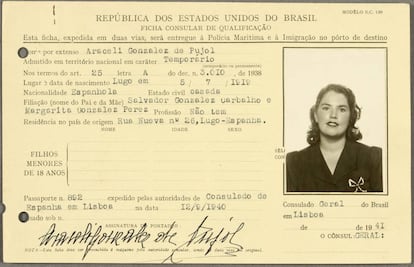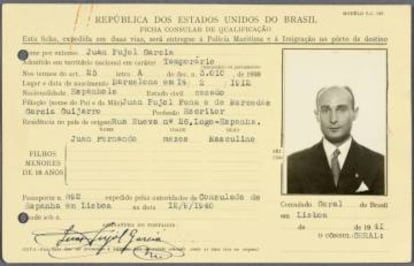How the D-Day landings were endangered by Spanish spy’s homesick wife
Newly declassified documents reveal that top double agent Juan Pujol’s spouse threatened to expose him

“Too much macaroni, too many potatoes and not enough fish.” That was how the UK diet was described by Araceli González, the unhappy wife of the Spanish spy and D-Day hero Juan Pujol, who worked for British spy agency MI5 and fed Adolf Hitler false information during World War II.
The weather was another source of discontent; despite being from rainy Lugo in Galicia, she found the grey skies and constant drizzle hard to bear.
I don’t want to live another five minutes with my husband. I don’t care if they kill me Araceli González
She also missed her mother and felt overwhelmingly lonely, since her husband forbade her to socialize with the Spanish contingent in London, for fear she would inadvertently drop hints of his double life. So her time was spent alone with the couple’s two small children in the north London house she grew to hate.
But while Araceli wouldn’t be the first Spaniard to have trouble adapting to life in Britain, her homesickness could have changed the course of history.
Codenamed “Garbo,” Spanish double agent Juan Pujol made Hitler’s intelligence services believe that he was coordinating a large network of spies from London. He also fooled them into thinking that the Normandy landings would happen later and further north, in the Pas de Calais region. But according to recently released documents from MI5, the success of the ruse was endangered by the breakdown of his marriage and his wife’s homesickness.
Miserable in the extreme, Araceli threatened to expose her husband’s double life if he didn’t take her back to Spain – MI5 had been concerned that if she returned home, she would let something slip to compromise the undercover operation.

In June 1943, her desperation drove her to an outburst in front of her husband’s case officer, Tomás Harris, “I don’t want to live another five minutes with my husband. I don’t care if they kill me, I’m going to the Spanish Embassy,” she cried.
This prompted MI5 to place police around the Spanish embassy to intercept her approach. It also prompted Harris, who taped the conversation, to write in a report: “She never managed to adapt to the English way of life or learn the language. Her desire to return to her country, and in particular to see her mother, has driven her to behave at times as if she were unbalanced. […] As her state worsened, she became more desperate and […] threatened she would leave her husband. As this did not produce the desired effect, she threatened to take action that would spoil the work and leave her free to return.”
Araceli González Carballo was born in Lugo in 1914 into a wealthy family. Her beauty inspired the Germans to codename her husband Arabel – a combination of “Araceli” and “bella.”
Her time was spent alone with the couple’s two children in the north London house she grew to hate
When the Spanish Civil War broke out, she went to work in a field hospital. In 1938, she moved to Burgos where she was secretary to the governor of the Bank of Spain. A year later, she met a young man named Juan Pujol.
Apparently, the pair fell in love immediately and were soon married. At the end of the war, they moved to Madrid where, worried by the spread of fascism in Italy and Germany, they approached the British Embassy offering to collaborate against the Germans. Their offer wasn’t taken seriously and so, according to the documentary Hitler, Garbo... and Araceli, the latter suggested that Pujol collaborate first with the Germans, thereby making him an invaluable asset to the British. The rest is history, and one that could have turned out very differently if Araceli’s desperation hadn’t been harnessed by an underhand trick.
Putting their heads together, Pujol and Harris realized that if they were able to fool Hitler, why not Pujol’s wife as well? Harris suggested telling Araceli that her husband had been discharged from MI5, but Pujol wanted to take it a step further and make her think her outburst had led to his arrest.
Blindfolding Araceli, MI5 took her to a detention center to speak to her husband, who persuaded her not to put his delicate espionage work in jeopardy. Sealing the deal, a document was brought in for her to sign, making her promise officially not to blow her husband’s cover or insist on returning to Spain. MI5 then pretended to release Pujol and, according to the declassified documents, Araceli “returned home very chastened to await her husband’s arrival.”
English version by Heather Galloway.
Tu suscripción se está usando en otro dispositivo
¿Quieres añadir otro usuario a tu suscripción?
Si continúas leyendo en este dispositivo, no se podrá leer en el otro.
FlechaTu suscripción se está usando en otro dispositivo y solo puedes acceder a EL PAÍS desde un dispositivo a la vez.
Si quieres compartir tu cuenta, cambia tu suscripción a la modalidad Premium, así podrás añadir otro usuario. Cada uno accederá con su propia cuenta de email, lo que os permitirá personalizar vuestra experiencia en EL PAÍS.
¿Tienes una suscripción de empresa? Accede aquí para contratar más cuentas.
En el caso de no saber quién está usando tu cuenta, te recomendamos cambiar tu contraseña aquí.
Si decides continuar compartiendo tu cuenta, este mensaje se mostrará en tu dispositivo y en el de la otra persona que está usando tu cuenta de forma indefinida, afectando a tu experiencia de lectura. Puedes consultar aquí los términos y condiciones de la suscripción digital.









































